We met in an apartment where Jaromír Nečas has lived since 1946. The music writer and director, folklorist and teacher who discovered world music by accident recently celebrated his 92nd birthday. At the age of six, he was hospitalised in Uherské Hradiště with bone marrow irritation and the prognosis was so bleak he even received his last rites. His fellow patients, a poacher from Znorovy and a winemaker from Petrov would pass glasses of wine back and forth across the bed with the sick boy. Occasionally they would offer him some wine. He claims that was what eventually saved him. By the way, a bottle of traminer was present at our interview. Actually, it was not really an interview but rather story telling or a series of associations which I bumped forward every now and then. We were surrounded by a piano, a few folk instruments and mountains of sheet music and books.
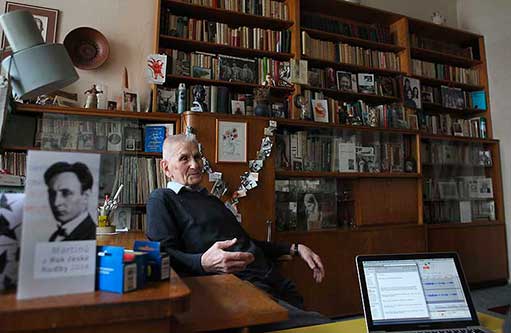 You still attend concerts at JAMU, I see you there often...
You still attend concerts at JAMU, I see you there often...
JAMU is a very communicative place for young talented musicians from all over the world. I am essentially a folklorist and I have plenty of singing in my line of work. So I don’t go to vocal performances often, even though I cannot say no to a good Bulgarian choir. After all, I am 92, my time management is not what it used to be and I am surrounded by everything I need.
Looking around, I notice these things aren’t just folklore.
No, this is a mix of everything. This is just poetry, many works from the nineties... I mean the 1890’s, like Sova and his contemporaries. I recently heard on TV that records are in style again.
Indeed, many bands release vinyls instead of CDs.
Not even CDs last forever. I have here some fine wine, traminer from Kobylí, if you’d like to try some. I also have local spring water from Luhačovice named Aloiska. My youngest son Radek brought it for me.
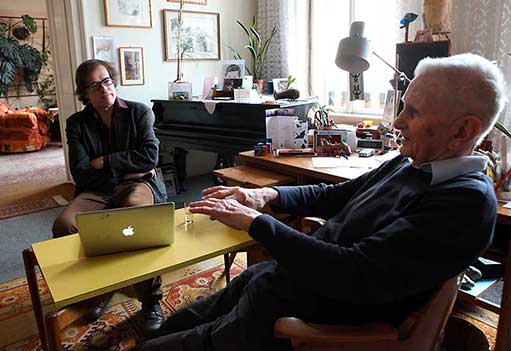 Speaking of poetry, you were friends with Kainar, Skácel, Mikulášek and Antonín Přidal.
Speaking of poetry, you were friends with Kainar, Skácel, Mikulášek and Antonín Přidal.
Přidal is a good friend of mine. I have all of his books. I mean almost. Mikulášek and I would often meet in the U šlechtičen café in the building of the Ethnographic Institute. There was a café there before 1989 frequented by musicians and writers. Mikulášek was a frequent guest. Especially after he broke his leg and was basically blacklisted after 1968. I don’t even know what he did but back then we all did something. He usually had a glass or two but nothing had ever happened. And one day he was totally sober, he stepped on something and broke his leg. He wrote to the writers’ union – which basically refused to help him at all – that he needed to stay at their headquarters until his leg had healed. He wrote to them “you are not going to kick me out, are you?” – well, they did.
Around the same time Kainar was appointed chairman of the preparatory committee of the writers’ union.
He didn’t want the job but he was basically forced by circumstances. He was never home; he spent a lot of time in Bechyně in the musicians’ headquarters. He was staying there with his second wife; his first wife lived in Brno. She was involved in puppet theatre so she was sent to a working exchange to Vietnam where the puppet theatre tradition went back many years, Kainar had moved out by the time she got back.
Rumour has it you would go straight from a wine bar back to the radio station building to play some records.
Oh yes, social drinking was not frowned upon back then. We would go there with Mikulášek and Skácel, the so-called hardcore radio station posse. We would always go to Solniční (street). There was (still is –ed.) a Bulgarian restaurant and a wine bar right across the street. Afterwards we would always decide to go to the radio station to play some records. Our hits included Veruju from the Glagolitic Mass or the singer who worked with Ellington. What was her name...Mahalia Jackson. There was also a version of Veruju for which I had Antonín Přidal rewrite lyrics, I recorded it with Jura Petrů’s cimbalom as the background music and then I would send it as a New Year’s greeting. I would always make a customised New Year’s greeting based on my life and the things in it.
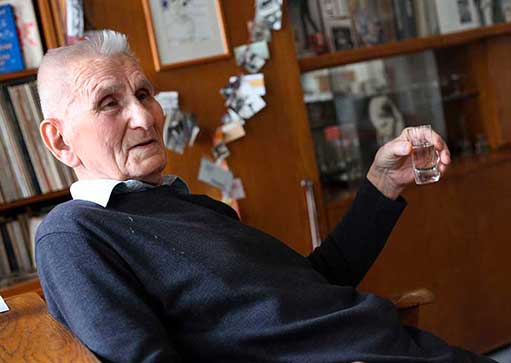 You played the cimbalom yourself.
You played the cimbalom yourself.
My beginnings with the cimbalom were hilarious. I was born in Kyjov and raised in Strážnice. My father was transferred to a new school of economics in Strážnice as its new principal. Back then I knew nothing about folklore and music in general. Not even later, after we had moved to Slavkov. I discovered my passion for music when we moved to Brno – I think I was in the tenth or eleventh grade. It was during the Protectorate. I found a piano teacher. When she had to move, she reassigned me to her own teacher who was a former pupil of Janáček’s. I started attending concerts at the Stadium where the main hall was. One day I heard people laughing in the local pub. I went in and saw Slovácký krúžek and my future bandleader was sitting at the cimbalom without legs. Instead, it was supported by four legs and four beer glasses. I joined and stayed in the company. After WWII I joined an ensemble named Úlehlovci. Vladimír Úlehla died shortly after WWII, having managed to finish his Živá píseň. His second wife Maryna took over. Later I was in the Radost ensemble where Kainar was also involved, as was their leading composer Ludvík Podéšť, a guy with an incredible sense of melody. He would always quickly scribble a few notes and two weeks later the record was released – Babičko, nauč mě charleston. Today he is out. Different times, a different way of thinking.
It can reappear one day, who knows...
Some things are forever. Do you see the three portraits behind me? Janáček, Bartók and Jan Novák. Novák was a tough cookie. He was one of the best composers but he really hated the regime. He was doing fine because he worked for Prague filmmakers. Once he composed five proverb-themed polka songs for the Brno Radio Orchestra. He managed to hide a secret jingle which meant “you can kiss our asses”. Some people just laughed but others reported him to authorities, and he was blacklisted. Once he did not go vote so they sent an envoy with a portable voting box to his house and he told them he did not have time because he had to think about music. So he was fired from the Brno chapter of the union of composers. His colleagues in Prague lobbied for him and he managed to survive until 1968. He realised he just couldn’t keep going so he took his family and they moved out. He died prematurely in Germany. His remains were relocated and he is interred next to Firkušný. Well, at least some satisfaction.
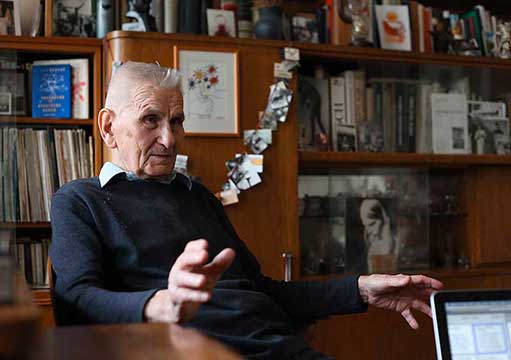 Let’s go back to the U šlechtičen café: there is a chapel where you recorded Jaroslav Hutka’s album Vandrovali hudci.
Let’s go back to the U šlechtičen café: there is a chapel where you recorded Jaroslav Hutka’s album Vandrovali hudci.
I did not care about his political songs. However, I was once at his concert in Prague and suddenly I heard him singing folk ballads and the audience joined in. That was unusual. So I invited him to Brno and we organised a concert for him. At that time he was already being spied on. A novelist from Brno named Jindřich Uher wrote an endorsement on the cover which included the verse “Dejte nám pána, který málo platí, jen když nám dovolí svobodně zpívati”. It was evident to us that the slogan is unacceptable but he released the album anyway. The concert was attended by the director of the museum, all various communist party leaders and even our top secret police officer who later become a director in televisions. He said he knew Hutka, his bad side of course.
You also helped Balada pro banditu…
It was a hit of Divadlo Na provázku, one of the best things they have ever done. It had many young stars, like Donutil, Bittová… So I recorded it and played in on air. Then I had a call from Prague, they requested the recording. My colleagues were laughing and joking that I was dead meat. However, Alois Indra (one of the key figures of the normalisation period) listened to the recording. He liked it so much that he ordered that it be recorded in stereo. But I liked the original mono recording better anyway. I still have it. These things kept happening to me...
You had quite a lot going on... did you look for the things that happended to you or would these things usually find you?
I consider myself a good journalist. As a cimbalom player, nothing I played was really art.
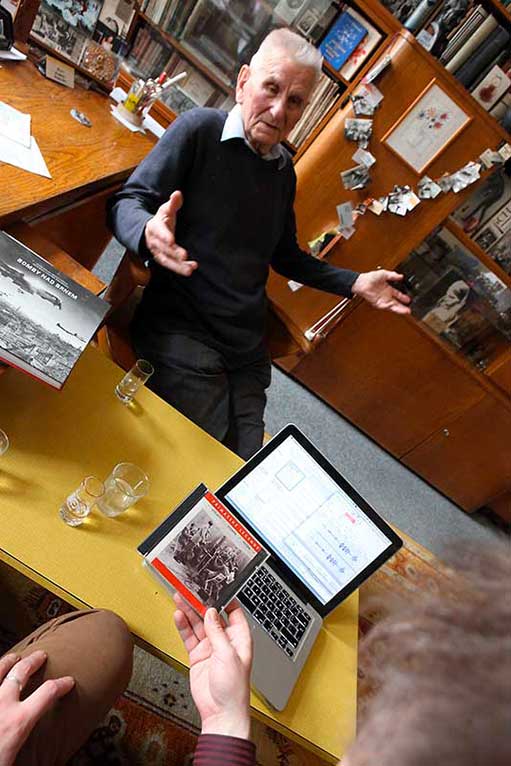 You also recorded Hradišťan’s first album.
You also recorded Hradišťan’s first album.
Hradišťan has a long history. Jura Pavlica is the most recent chapter. An English friend of his liked to come here to the festivals in Strážnice. He was getting married for the second time and he invited Hradišťan. After WWII I spent two years in England with my sister. She went there as an au pair before the war but the main reason was that she had her boyfriend there. After the war they let us know that they were alive and had two kids. Director Evžen Sokolovský was studying in Brno back then and he founded an experimental theatre company. One day he showed up at my door, saying that he and his ensemble had nowhere to live and they were coming to stay in my place. Their dramaturge brought a suitcase full of books from the university library – I don’t even know whether he returned them.
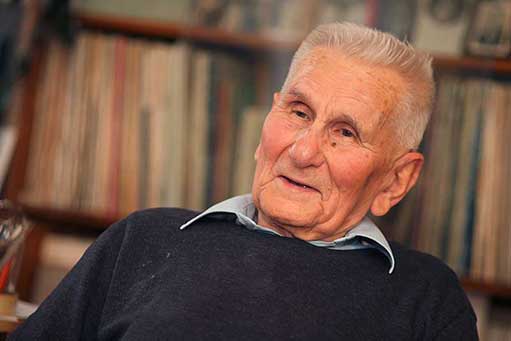 You already lived in this apartment?
You already lived in this apartment?
I moved in shortly after 1945, it was damaged after an air raid. Three houses in a row belonged to one Mr. Černý. I knew his three sons from the boy scouts. We needed a clubhouse and they said no problem, all we have to do is clear it with the authorities. Since I had nowhere to live I went and it was resolved promptly. Not many people lived here. There was one German family, but I never met them. And so Evžen used the place to rehearse with the theatre company. I liked one of the actresses but Evžen liked her too. She chose him, which was a good reason to leave. So I went to England, lived with my sister and went to school there for two years. How did we change the subject? This used to happen to Dr. Ludvík Kunz, director of the Institute of Ethnography. He would be walking on the stage, start panicking and say “I forgot what I wanted to say, I am gonna say something else”.
We can do that. But we were talking about Hradišťan.
Right. Jura Petrů senior, Slávek Volavý and Jaroslav Staněk were a trio of bandleaders who meant something. I even recorded a CD for them. It features Vladimír Úlehla, one of the co-founders of the festival in Strážnice. He didn’t live to see the second one. Staněk toured Europe with Hradišťan but they still did not have an album out. So we tried to record one via Panton, no problem. After 1968 he had problems of his own even though there was nothing political about their work. Communists did not even want to lend them costumes. He had a “beautiful” funeral, if you can call it that. My colleague Jaroslav Jakubíček, who was BROLN’s dramaturge in the radio station, went home from the funeral with a Roma musician from Velká nad Veličkou. The guy was praising the quantities of food and wine and said that a funeral like that should be a bi-weekly thing.
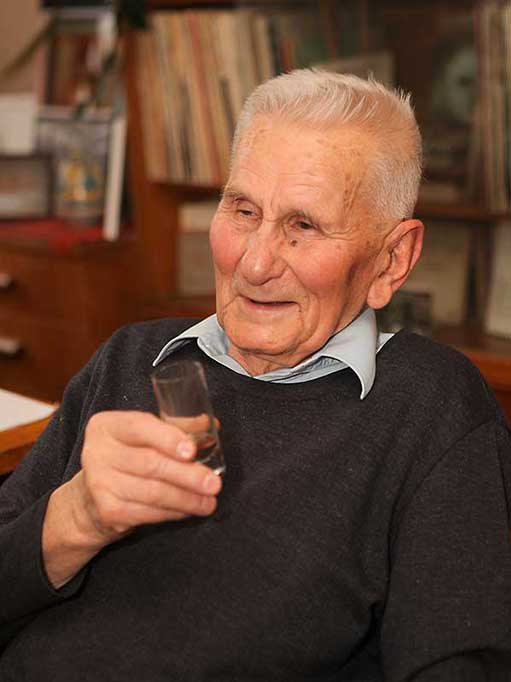 You invited Petr Ulrych and his wife to the radio station for the first time.
You invited Petr Ulrych and his wife to the radio station for the first time.
I discovered them as a radio presenter. Music that sounded even a bit “western” was frowned upon. I was a radio dramaturge for Gustav Brom back then and I knew a new style of music with refreshing rhythm was emerging so I gave it a shot. I had a one-hour programme on Sunday mornings which had to be filled up somehow. I could not use the official Brno Radio Orchestra over and over. I recorded something with Ulrych and his wife, just like I played these young bands on a regular basis. I don’t even remember their names. I meet the musicians every now and then; they are old geezers like me. Whenever I can’t sleep at night I watch the ČT2 channel I watch reruns of some old culture programmes and the people are in them.
You also played the cimbalom with Břetislav Bakala.
How did you find that out? The Brno Symphonic Orchestra was initially associated with the radio. Back then the son of the famous violinist Kubelík was a member. One day he was rehearsing in the studio, I was watching him from a gallery and I saw the sheet music and his face, he was really a handsome man. Once I was in Velká at Horňáky and I saw some musicians in folk costumes. I asked them where they were going and they said “some Kubelich wants to hear us play”. Never mind, back to Bakala and the cimbalom. Osvald Chlubna, a composer from Brno, was also touched by folklore. He wrote a symphonic dance of the recruits for various instruments which included the cimbalom. There were three of us – Běhúnek was even worse than me and Antoš Frolka could not be reached. The sheet music was complicated but I was hoping to be able to play at least something. And since it was a symphonic piece I thought nobody would notice. Bakala came in during the rehearsal – he was not supposed to be the conductor – and he just wanted to see the sheet music for the cimbalom. At that point I messed up completely, he just smiled and left.
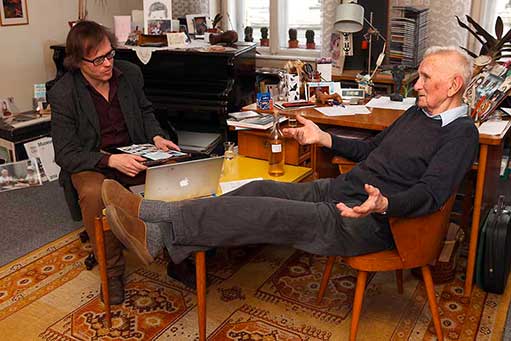 Apart from the piano, you have some folklore instruments here. What is the brass instrument over there?
Apart from the piano, you have some folklore instruments here. What is the brass instrument over there?
It is a trumpet from Romania. I had a friend from Switzerland who was essentially a businessman. He often visited Eastern Europe because he knew we had music styles that were unknown to Western Europe. First he found some in Romania and he released an album via Phillips. Later he founded his own label. Its portfolio was huge. He died shortly before Christmas last year at the age of 88 while listening to his recordings of Le Mystere des voix Bulgares (Mysteries of Bulgarian voices). Once he was in Prague scouting for folklore recordings. I was working with BROLN on Janáček’s Napěknú notečku. It featured Dušan Holý, Luboš Holý or Jarmila Šuláková. They were all young and it was bright. He wanted to meet me so he had his assistant call me. It was during the late fifties and early sixties. We were behind the Iron Curtain and nobody was coming here. The director of the radio station told me not to invite him in and take him to a pub where the state police will see us. Accidentally, my wife had gone shopping and forgot to close the door. I was fixing the blinds when suddenly I hear “Are you mister Nečas? I am Marcel Cellier, pleased to meet you”. It was too late to kick him out and since he wanted to listen to some of my archives I thought “we might as well, I am in trouble anyway”. I showed him the radio station and we went to Tvrdonice to a ball. He was thrilled and he invited them to Switzerland. The friendship between Chanson de Lausanne and Břeclavan lasted for decades. And we would meet occasionally in spite of all the trouble.





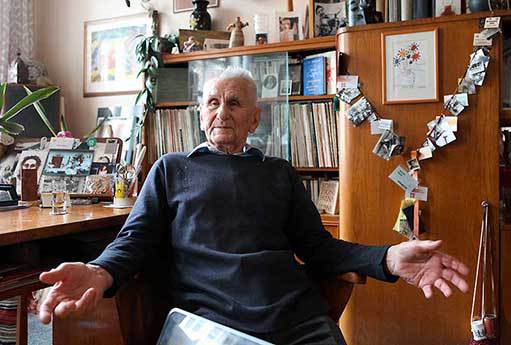



























No comment added yet..